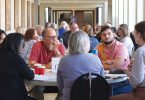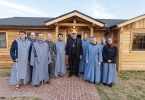Benedictine Sisters’ ministry offers a new beginning for incarcerated women
by Bob Hart
On the outside, their lives are most often bleak.
Addiction. Poverty. Fear.
On the inside, things aren’t much better.
“It’s all steel and concrete. The chairs are attached to the tables. And it’s loud — very, very noisy in there — because there’s nothing to absorb the sound,” said Sister Barbara McCracken, OSB, who visits incarcerated women in the Wyandotte County Detention Center as part of her work with the Keeler Women’s Center in Kansas City, Kan.
“They can’t see outside. They can’t go outside,” she said. “They have a lot of lockdowns in their cells, sometimes 23 hours a day. It’s not good for mental health.”
And, Sister Barbara added, many of them are going through drug withdrawal — alone, sick and terribly frightened. Some, including those detoxing, are pregnant.
“What we offer them is an outreach,” said Marla Looper, Sister Barbara’s co-worker in Keeler’s ministry to incarcerated women.
“We’re not a governmental agency,” said Looper. “We’re just people who care.
“When they see that, it’s hugely important in getting them to make that first phone call to us.”
No boundaries
Get your life together. Pull yourself up by your bootstraps. Just say no.
Well-intentioned individuals and society as a whole are full of advice for drug addicts, alcoholics and criminals. What they may lack at times is an understanding of the big picture in the lives of those people, particularly women.
Sister Barbara painted a composite picture of a woman being released from jail and struggling to get her life on the right track.
She’s a drug addict. She’s homeless. She’s faced a lifetime of domestic abuse. She lacks support from a spouse, partner or family. She has no money and no job skills. She may not even have any form of identification, like a driver’s license or birth certificate. And she’s quite accustomed to being dismissed — as unworthy, as a bother, as a statistic.
Sister Barbara, Looper and the volunteers at Keeler offer these women an alternative view.
“There’s a strength in these women,” said Looper. “They’re fighters.”
“I sometimes say to them, ‘Many women your age, in your situation, are dead,’” Sister Barbara said. “‘You’re not. There’s obviously something special going on with you. You’ve got something you need to do here in this life.’”
And so the Keeler Women’s Center accepts the struggles the women face and welcomes them with a policy of “no boundaries.” The ministry for incarcerated women welcomes those from a cross section of society: Although some hail from the suburbs and boast master’s degrees, the majority are single parents living in poverty.
It was out of a desire to serve the poor that the Benedictine Sisters founded Keeler in the first place, in 2003. Originally housed at Donnelly College, the ministry moved to the second floor of the Catholic Charities building on Central Avenue in January 2008.
“I do think we make a difference in women’s lives,” said Sister Carol Ann Peterson, director of the center. “We’re just trying to get the word out, so more of them will come to us.
“All three of us Sisters on staff gave up professional salaries to be here. We’re behind this, 100 percent. Keeler Women’s Center is here for the long haul. And this ministry to incarcerated women is an important part of what we do. Sister Jerome, who founded the Benedictine Sisters, always believed in serving those who would not otherwise be served. That’s what Sister Barbara, Marla and our volunteers are doing with these women.”






